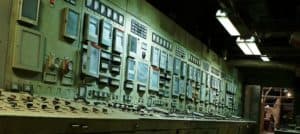Automation Glossary: HMI (Human-Machine Interface)
What Is A HMI (Human-Machine Interface)?
HMI, or Human-Machine Interface, is a technology designed to connect people with machines, facilitating smooth interaction and control. HMIs vary from basic control panels with buttons and indicators to sophisticated systems featuring touchscreens and advanced software. They play a crucial role in sectors such as manufacturing, energy, and transportation, where they enable operators to efficiently monitor and manage machinery and processes.
What Are HMIs Used For?
- Manufacturing: HMIs make it easier to control robotic arms, conveyor systems, and other automated equipment in production lines.
- Process Control: HMIs are used to monitor and regulate parameters such as temperature, pressure, and flow rates in industries like chemical manufacturing and refining.
- Energy Generation: HMIs are used to oversee and manage energy systems, including power plants, wind turbines, and solar energy installations.

Related Terms
Occupancy detection within vehicles is a technological system engineered to determine the presence and number of individuals inside a vehicle....
A tensile tester is a device designed to quantify the tensile strength of substances, representing the maximum force a material can endure before fracturing under tension....
Products and Services
Further Reading

There are many reasons for wanting to implement a new control system on your mobile machine. However, you first have to ask yourself “is my machine right for a control system and will the market I serve accept it?” In addition, you need to consider how the people that operate
April 27, 2020


Different mobile machines have different display requirements. Whether your machine requires a simple engine interface to meet Tier IV engine requirements, or it requires a complex HMI (human machine interface) to allow the operator to either run the machine or provide valuable operating and troubleshooting information
April 28, 2020







